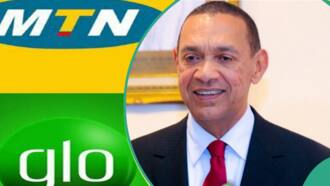NCC Warns Nigerian Phone Users to Beware of "Wangiri" Missed Call Scam
- The NCC has warned Nigerians to be careful of certain phone codes that call and drop in expectation of a callback
- The Commission noted that calls associated with this scam predominantly originate from smaller or developing nations
- Telecom provider MTN Nigeria has issued guidelines to adhere to in order to avoid being a victim of the scam
PAY ATTENTION: The 2024 Business Leaders Awards Present Entrepreneurs that Change Nigeria for the Better. Check out their Stories!
Legit.ng journalist Victor Enengedi has over a decade's experience covering Energy, MSMEs, Technology and the stock market.
The Nigerian Communications Commission (NCC) has issued a cautionary alert to the public regarding the rampant "Wangiri" phone scams affecting many mobile users across Nigeria.
This development follows the Commission's earlier public notice that it had received complaints from over 20,000 Nigerians who have fallen victim to telecom fraud.

Source: UGC
"Wangiri", a term of Japanese origin signifying "one ring and drop," has become associated with a widespread fraudulent scheme targeting mobile phone users.
PAY ATTENTION: Share your outstanding story with our editors! Please reach us through info@corp.legit.ng!
In this type of scam, perpetrators make brief calls to individuals, promptly disconnecting and expecting the recipient to initiate a return call.
How "Wangiri" missed call scam works
Per information from the NCC, this fraudulent scheme involves scammers initiating a solitary ring to a mobile phone, prompting the recipient to redial the missed call.
Should the individual decide to return the call, they may unknowingly connect to a high-cost number, possibly an international one, resulting in premium rate charges.
Consequently, this could lead to the person incurring a substantial expense for the call.
Suspicious codes used for scam
Calls associated with this scam predominantly originate from smaller or developing nations.
Recent instances have involved calls from countries like Botswana, Guinea, and Guyana, identifiable by their respective dialling codes +267, +224, and +592.
Blocking these strange calls proves challenging since the numbers change with each missed call, adding to the unsettling nature of the situation.
The scam may persist for a particular phone user over a few days, exploiting curiosity and leveraging the brief confusion resulting from the missed call.
To prevent falling prey to "Wangiri" fraud, telecom consumers are strongly advised against returning calls from unfamiliar international numbers and are encouraged to block any suspicious numbers that may arise promptly.
In a similar notice, the NCC had warned Nigerians to exercise extra caution when charging their phones in public places because of the potential of fraudsters to hack into the devices.
How to stay safe from the scam
In a notice to its users, Nigeria's telecommunication giant, MTN Nigeria, issued instructions on how to avoid becoming a victim of the phone scam.
It stated:
Limit Callbacks to Known Numbers: A general guideline is refraining from returning calls from international numbers you do not recognize.
Genuine Calls Will Repeat: Authentic callers usually make repeated attempts or leave a voicemail if they genuinely need to reach you.
Stay Alert to Suspicious Prefixes: This scam often involves specific international prefixes, like +175 (Saint Lucia), +269 (Comoros), +682 (Cook Islands), and others. Familiarizing yourself with these prefixes can assist in identifying potential scams.
NCC says WhatsApp is now main target for hackers
Meanwhile, Legit.ng earlier reported that the NCC warned WhatsApp users that the platform has become the primary target of hackers and scammers looking to gain unauthorized access to users' accounts.
The Commission disclosed this in an advisory to Nigerian users, asking them to be security conscious while on the platform.
It recommended that users activate Two-Factor Authentication (2FA) to become hackproof.

Read also
Nigerian billionaire, Ekeh discloses reasons GSK, other International companies are leaving Nigeria
It described the 2FA as an identity and access management security procedure requiring two forms of identification to access resources and data on WhatsApp.
PAY ATTENTION: Donate to Legit Charity on Patreon. Your support matters!
Source: Legit.ng



